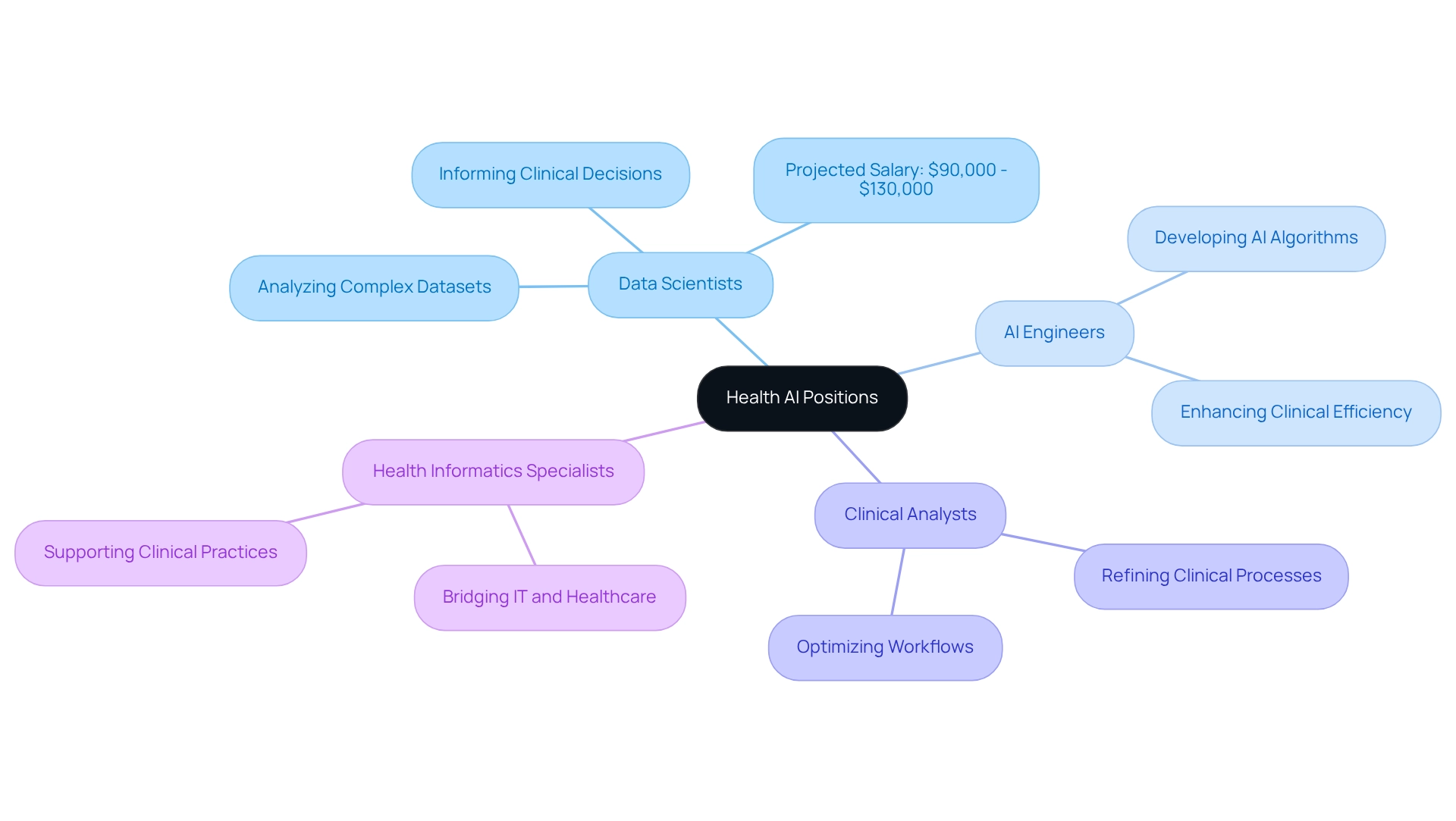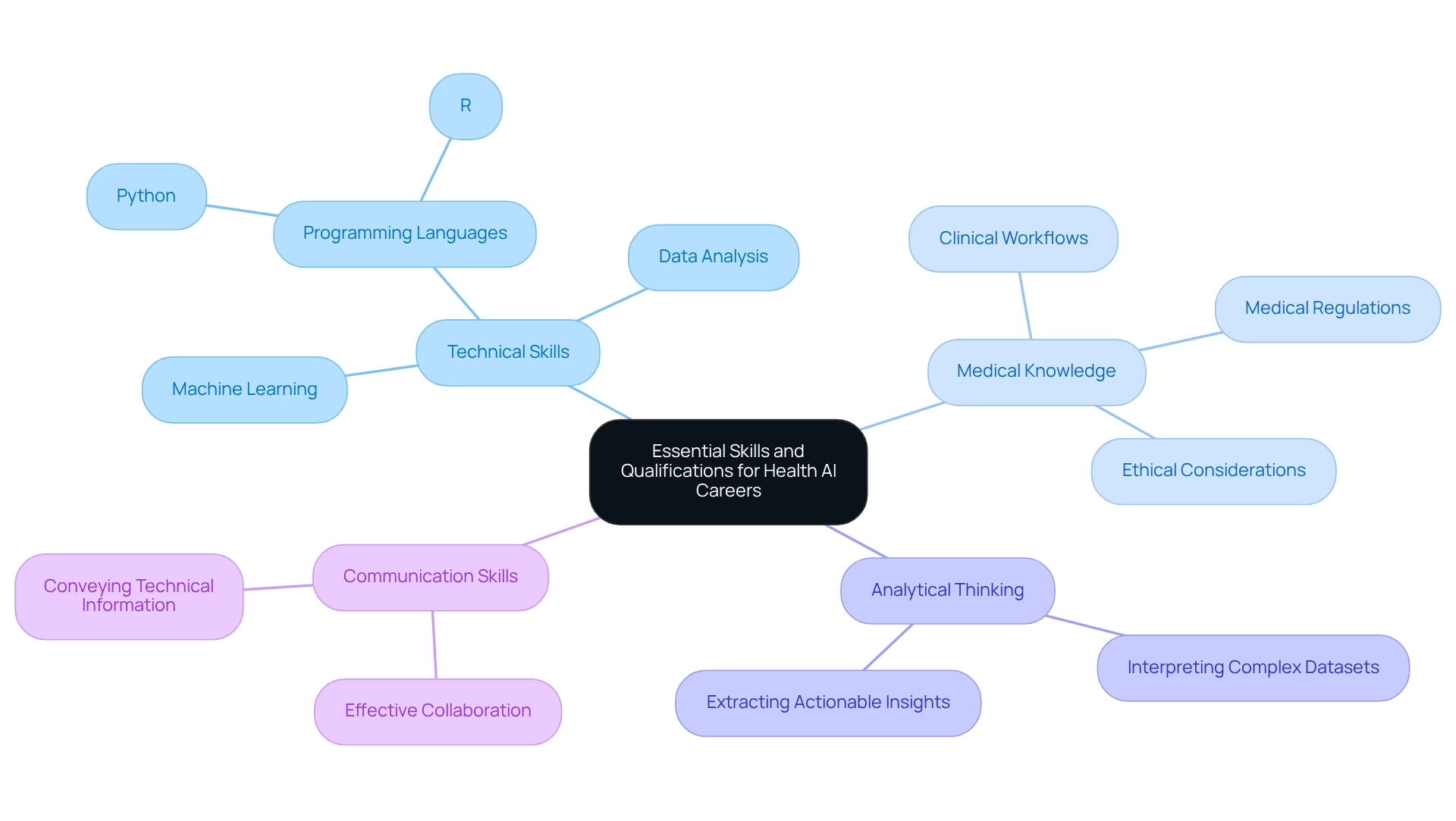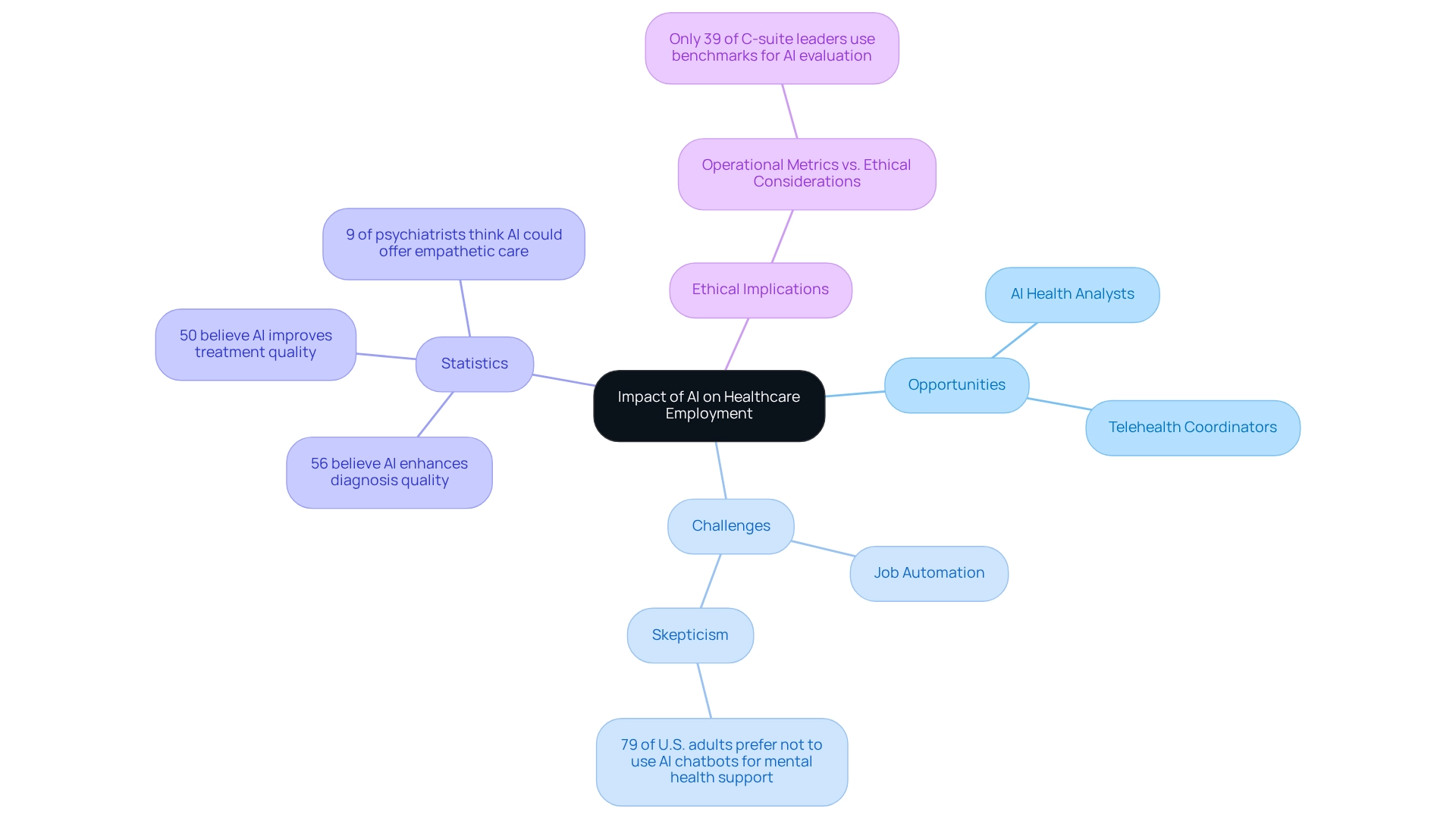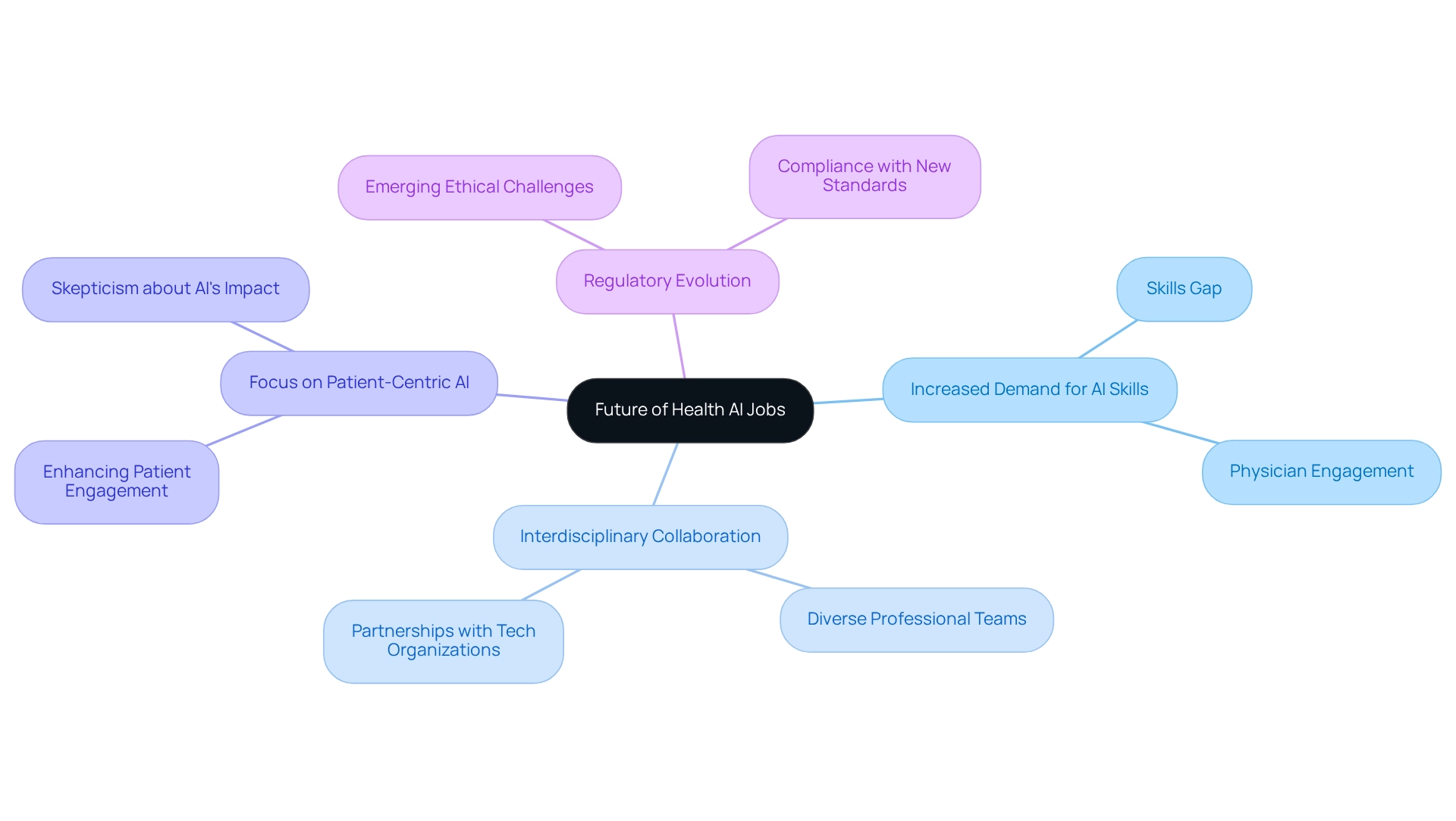Overview
The world of Health AI jobs encompasses a diverse array of roles, such as data scientists, AI engineers, clinical analysts, and health informatics specialists. These positions are dedicated to improving medical service delivery and enhancing patient outcomes through the power of artificial intelligence. As healthcare providers face increasing pressures, the demand for these roles continues to grow, driven by the need for specialized expertise that can address operational challenges and improve clinical efficiency.
However, it’s essential to recognize the emotional challenges that healthcare professionals encounter daily. The integration of AI in healthcare, while promising, also raises ethical considerations and public skepticism regarding its role in patient care. This concern is valid and deserves attention, as we strive to navigate these complexities together.
By embracing Health AI, we can alleviate some of the administrative burdens that often hinder patient care. Imagine a future where technology supports healthcare providers, allowing them to focus more on their patients and less on paperwork. This transition not only enhances efficiency but also fosters a more compassionate approach to patient care.
As we move forward, let’s engage in conversations about these vital roles and the positive impact they can have on our healthcare system. Together, we can ensure that the integration of AI serves to uplift both providers and patients, creating a more supportive and effective healthcare environment.
Introduction
In the rapidly evolving landscape of healthcare, the integration of artificial intelligence is not just about technology; it’s about redefining patient care and the essential roles of professionals within the industry. Have you felt the weight of administrative burdens that can impact the quality of care? As health AI jobs gain prominence, a diverse array of positions emerges, each vital to harnessing the potential of AI technologies. From data scientists to clinical analysts, these dedicated professionals are at the forefront of transforming healthcare delivery and improving patient outcomes.
Yet, while the demand for AI expertise surges, we must also navigate the challenges of public perception and ethical considerations. This journey is not without its complexities, and it’s important to acknowledge the emotional landscape that healthcare providers traverse. This article delves into the various roles within health AI, the skills required for success, and the profound impact of AI on the future of healthcare employment. Together, we will explore the opportunities and responsibilities that come with this innovative shift, inviting you to engage with the possibilities ahead.
Defining Health AI Jobs: An Overview of Roles in the Industry
represent a diverse array of positions that harness the power of artificial intelligence to improve medical service delivery and enhance patient outcomes. Key roles in this field include data scientists, AI engineers, clinical analysts, and health informatics specialists. Each professional plays a vital role in integrating AI technologies within medical environments, contributing to more efficient workflows and better decision-making processes.
As we look toward 2025, health AI jobs are experiencing significant growth, driven by an increasing demand for innovative solutions to the complexities of modern medical services. Currently, approximately 10% of medical professionals are utilizing AI-powered tools to improve diagnostic accuracy and treatment planning, showcasing a growing acceptance of AI's role in clinical practice. This trend is supported by many Americans who express optimism about AI's potential to enhance access and affordability in the years ahead.
Yet, a recent survey indicates that 60% of Americans would feel uneasy if their medical provider relied on AI for treatment, while 39% are comfortable with the idea. This divide in public opinion underscores the challenges that startups in the medical field face as they navigate resistance to innovation, particularly from cautious physicians concerned about maintaining the standard of care and patient interactions.
Current trends show that medical organizations are proactively incorporating health AI jobs into their operations, recognizing the necessity for specialized expertise to adapt to the evolving landscape. For instance, many institutions are hiring clinical analysts to interpret AI-generated data, ensuring that insights are effectively transformed into actionable clinical strategies. It is essential for medical professionals to observe AI enhancing workflows, decision-making, and outcomes to foster broader acceptance of these technologies.
Statistics reveal that medical professionals are increasingly aware of AI's benefits, with many noting improvements in workflow efficiency and quality of service. Conor Stewart, a research expert in health and pharmaceuticals, noted, "A significant advantage of AI in medical services could enable health professionals to experience reduced stress levels, less time working overtime, and more time dedicated to direct patient care." This shift not only enhances job satisfaction but also cultivates a more compassionate medical environment.
However, traditional accelerators often lack the specific resources and understanding required to effectively support medical startups in this innovative landscape. This limitation can exacerbate the challenges faced by startups as they strive to gain traction in a sector that is inherently cautious about embracing new innovations. In summary, the evolution of health AI jobs is profoundly transforming the medical landscape, as professionals in this field play crucial roles in driving innovation and improving patient outcomes.
As the industry continues to evolve, the integration of AI technologies is likely to lead to more streamlined processes and enhanced care delivery. The case study titled 'Usage of AI Tools by Medical Professionals' illustrates this trend, showing that approximately 10% of medical professionals are currently using AI-powered tools to enhance solution effectiveness in diagnosing and treatment planning.
Types of Health AI Positions: From Data Scientists to Clinical Analysts
The health AI job sector presents a range of roles, each uniquely contributing to the integration of artificial intelligence in medical services. These roles are not just about technology; they address the emotional and operational challenges healthcare providers face daily. Consider the following key positions:
- Data Scientists: These professionals are essential in analyzing complex medical datasets, extracting actionable insights that inform clinical decisions and enhance outcomes for individuals. As the demand for data-driven strategies in healthcare rises, the need for is projected to grow significantly in the coming years.
- AI Engineers: Tasked with developing and implementing AI algorithms for medical applications, AI engineers play a vital role in creating solutions that enhance clinical efficiency and patient care. Their work ensures that AI innovations are not only creative but also practical and effective in real-world settings.
- Clinical Analysts: Focused on refining clinical processes, clinical analysts ensure that AI tools align with the operational needs of medical providers. By optimizing workflows and improving user experiences, they facilitate the seamless incorporation of AI advancements into everyday clinical practices.
- Health Informatics Specialists: Acting as a bridge between IT and healthcare, health informatics specialists ensure that data systems effectively support clinical practices. Their role is increasingly significant as medical organizations strive to leverage technology to enhance patient care while adhering to regulatory standards.
Each of these roles is crucial for the effective integration of AI in medicine, especially as the sector grapples with challenges like fragmented medical systems, regulatory hurdles, and physician fatigue. The incorporation of AI can help close gaps in service delivery, improve access to care, and address the resistance to innovation often encountered among medical providers. As this landscape evolves, the demand for health AI jobs is anticipated to rise, with competitive salary ranges reflecting the specialized skills required.
For instance, data scientists in healthcare can earn salaries ranging from $90,000 to over $130,000 annually, depending on their experience and expertise.
The integration of AI in the medical sector not only enhances operational efficiency but also significantly impacts job satisfaction among healthcare providers. By automating routine tasks, professionals can devote more time to direct patient care, fostering a more compassionate medical environment. Notably, AI-driven robotic surgeries can reduce hospital stays by more than 20%, leading to annual savings of $40 billion, underscoring AI's financial impact in healthcare.
CosmaNeura exemplifies this transformation, as highlighted in the case study.

Essential Skills and Qualifications for Health AI Careers
To excel in health AI jobs, candidates must possess a combination of technical and interpersonal abilities that are essential for managing the intricacies of the medical field. This can be a daunting task, but with the right skills, it becomes manageable. Key competencies include:
- Technical Skills: Proficiency in programming languages such as Python and R is fundamental, alongside expertise in machine learning and data analysis. These abilities empower experts to create and apply AI solutions efficiently, which are vital for revolutionizing medical services and improving treatment.
- Medical Knowledge: A solid understanding of clinical workflows, medical regulations, and ethical considerations is vital. This knowledge ensures that AI applications conform to industry standards and improve patient care, addressing the challenges of fragmentation and inefficiencies in the medical system.
- Analytical Thinking: The ability to interpret complex datasets and extract actionable insights is essential. Data scientists play a critical role in the medical field by transforming raw data into meaningful information that drives decision-making. As noted by the National Institute of Standards and Technology Big Data Working Group, "data scientists extract knowledge from data to drive action."
- Communication Skills: Effective communication is paramount for collaboration with medical professionals. The ability to convey technical information in an understandable manner fosters teamwork and enhances the implementation of AI solutions, which is crucial for improving provider efficiency and patient experiences.
Educational backgrounds for health AI professionals often include degrees in computer science, data science, health informatics, or related fields. As the demand for skilled professionals in health AI jobs grows, ongoing professional development and training are becoming increasingly important. For instance, essential skills for health AI jobs in 2025 will likely include advanced machine learning techniques, natural language processing, and a strong foundation in medical knowledge.
CosmaNeura exemplifies how these skills are applied in practice. By automating administrative tasks and offering AI-driven services such as telehealth transcription, diagnostic guidance, and billing optimization, CosmaNeura enhances medical delivery, improves job satisfaction among providers, and ensures adherence to ethical medical practices. This commitment to quality evaluation is a key driver of success in our innovative AI solutions, allowing us to continuously refine our offerings based on real-world feedback.
Statistics indicate that top earners in roles such as can command salaries upwards of $150,000, reflecting the lucrative opportunities available in this field. Furthermore, educational programs tailored to health AI jobs are emerging, equipping professionals with the necessary skills to excel in this field. As highlighted by industry experts, continuous learning and adaptation are crucial for maintaining relevance in this rapidly evolving landscape.

The Impact of AI on Healthcare Employment: Opportunities and Challenges
The integration of health AI jobs in medical services is reshaping the employment landscape, presenting a complex mix of opportunities and challenges. Many healthcare providers may feel uncertain about how these changes will affect their roles. On one hand, AI advancements are paving the way for new health AI jobs that focus on overseeing and interpreting AI systems, which is essential in . For instance, as AI progresses, health AI jobs like AI health analysts and telehealth coordinators are arising, indicating an increasing need for specialists who can connect technology and individual support.
Conversely, certain traditional roles are increasingly at risk of automation, particularly those that involve repetitive tasks. Administrative functions, such as patient intake and billing processes, are being streamlined through AI, which enables medical professionals to dedicate more time to direct patient care. This change not only boosts job satisfaction but also elevates the overall quality of medical service delivery. How might your day-to-day experience improve if you could focus more on patient interactions?
Statistics indicate that:
- 56% of healthcare professionals believe AI will enhance the quality of diagnoses.
- 50% are confident it will improve treatment quality.
- A significant 9% of psychiatrists believe AI could provide compassionate support to patients, indicating a range of views on AI's function in mental health.
However, skepticism remains; a study revealed that 79% of U.S. adults would prefer not to use AI chatbots for mental health support without the oversight of licensed therapists, highlighting concerns about the effectiveness of AI in sensitive areas of care.
Moreover, industry analysts predict that by 2025, the demand for health AI jobs will significantly outpace that of traditional positions, driven by the need for skilled professionals who can navigate the complexities of AI integration. Yet, challenges persist, as only 39% of C-suite leaders currently utilize benchmarks to evaluate AI systems, often prioritizing operational metrics over ethical considerations. This gap highlights the significance of creating frameworks that guarantee AI technologies are applied responsibly and effectively within medical environments.
As Marc Benioff, co-founder of Salesforce, aptly stated, "This is providing a 'digital workforce' where humans and automated agents work together to achieve customer outcomes." This viewpoint is especially pertinent for faith-based medical providers like CosmaNeura, which emphasizes the ethical considerations of AI integration in accordance with Catholic teachings. In summary, while AI presents promising opportunities for health AI jobs in the healthcare sector, it also necessitates a careful examination of its impact on existing roles and the ethical implications of its integration. How can we ensure that these advancements truly serve the needs of both healthcare providers and patients, particularly for those who may be resistant to change?

Ethical Considerations in Health AI: Responsibilities of Professionals
Professionals in health AI navigate a complex ethical landscape that requires thoughtful attention to several vital factors:
- Patient Privacy: Protecting patient data is of utmost importance, necessitating compliance with regulations like HIPAA. The challenges of safeguarding individual privacy in the AI era are significant, particularly given the vulnerabilities revealed by a 2019 study showing that algorithms could connect to real individuals. Strong privacy measures are essential in AI applications to protect sensitive information and foster trust in medical services.
- Bias and Fairness: The potential for bias in AI algorithms poses serious risks to individual outcomes, particularly in a healthcare environment increasingly focused on equitable treatment. It is crucial to address these biases to ensure that AI solutions enhance healthcare rather than worsen existing disparities. There is a growing acknowledgment of the need for fairness in AI systems, prompting organizations to implement strategies that minimize bias and promote equitable service delivery.
- Informed Consent: It is vital that individuals are fully aware of how their data will be used in AI applications. This includes ensuring they understand their rights regarding data withdrawal. The call for innovative regulatory frameworks, as highlighted in the case study 'The Need for Regulatory Innovation in AI,' underscores the importance of ongoing informed consent, reinforcing individual agency in the evolving healthcare landscape. This is particularly important as AI technologies become more integrated into patient care processes, ensuring that patients remain informed and empowered.
- Accountability: Defining clear lines of responsibility for AI-driven decisions in clinical settings is essential. As AI technology advances, the need for accountability becomes increasingly critical to maintain trust in these systems. Additionally, healthcare organizations face challenges in innovation due to reluctance to disrupt the status quo and the dominance of established competitors, complicating the integration of AI advancements. Upholding accountability in AI applications is vital for building trust and ensuring that these innovations genuinely enhance healthcare.
Maintaining these ethical standards is not merely a regulatory duty; it is crucial for instilling confidence in AI systems and ensuring they enhance, rather than detract from, patient care. As experts in the field emphasize, incorporating ethical considerations into health AI roles is essential for the responsible advancement of innovations in medical services, ultimately benefiting individual outcomes and provider efficiency. Moreover, by addressing challenges such as fragmented medical systems, rising costs, and physician burnout, AI innovations can significantly transform patient care.
CostaNera is dedicated to upholding ethical standards while harnessing AI innovations to improve patient care and enhance provider efficiency.
The Future of Health AI Jobs: Trends and Predictions for the Industry
The future of health AI positions is poised for significant growth, driven by key trends that are reshaping the industry.
- Increased Demand for AI Skills: As medical organizations increasingly integrate AI technologies into their operations, the need for skilled professionals in this field is set to rise. This is particularly important given that only a small percentage of medical providers currently feel equipped to leverage AI effectively, highlighting a considerable gap that requires attention. According to , doctors express a strong likelihood of using AI-powered tools for administrative tasks, underscoring the urgent need for AI skills in this domain. However, engaging physicians in these discussions can be challenging due to their risk-averse tendencies and concerns about maintaining quality care.
- Interdisciplinary Collaboration: The complexity of health AI solutions calls for collaboration among a diverse range of professionals, including medical providers, data scientists, and AI engineers. This interdisciplinary approach is vital for creating effective applications in health AI that address real-world medical challenges. Successful health AI roles often emerge from teams that blend clinical expertise with technical knowledge, fostering innovation and enhancing healthcare delivery. Additionally, partnering with experienced tech organizations like CosmaNeura can help medical institutions prepare for AI integration and ensure sustainability, particularly in overcoming resistance to change.
- Focus on Patient-Centric AI: Future developments in health AI will center on applications designed to enhance patient engagement and improve care outcomes. This shift reflects a growing recognition of the importance of maintaining strong patient-provider relationships, even as innovations become more ingrained in medical services. Despite some skepticism—evidenced by the fact that only 13% of individuals believe AI will enhance these relationships—there is a clear trend toward creating AI tools that support rather than replace human interaction. Addressing the concerns of medical providers is critical in this context, as their support is essential for the successful adoption of AI.
- Regulatory Evolution: As AI technologies continue to advance, the regulatory frameworks governing their use in healthcare will also evolve. This evolution will present new ethical and operational challenges, which will impact job roles and responsibilities within the sector. Professionals in health AI must remain informed about these changes to navigate the landscape effectively and ensure compliance with emerging standards. Staying abreast of these trends is crucial for those aiming to thrive in health AI roles. The landscape is dynamic, and those who adapt to these changes will be well-positioned to contribute to the future of medical services. Furthermore, case studies such as the one on public perception of AI in medicine reveal varying levels of public support for AI applications, with notable interest in AI-driven skin cancer screenings and surgical assistance. This underscores the importance of addressing public and provider concerns as the industry evolves.

Leveraging AI in Healthcare: Enhancing Provider Efficiency and Patient Care
AI technologies are revolutionizing healthcare delivery by:
- Streamlining Administrative Tasks: By automating routine processes such as patient intake and billing, AI allows healthcare providers to dedicate more time to patient care. This shift not only enhances operational efficiency but also alleviates the administrative burden that often detracts from clinical responsibilities. It addresses concerns that innovation may disrupt the quality of care, allowing providers to focus on what truly matters—their patients.
- Enhancing Diagnostic Precision: AI systems are increasingly proficient at analyzing extensive volumes of individual data, resulting in more precise diagnoses and customized treatment suggestions. This ability is essential, as research shows that AI can greatly improve diagnostic accuracy. This advancement benefits individuals and assists in establishing confidence among medical practitioners who may have doubts.
- Enhancing User Engagement: AI-driven tools enable improved communication between individuals and providers, fostering a more interactive medical experience. Improved engagement is associated with increased patient satisfaction rates, as individuals feel more involved in their treatment processes. This involvement can help reduce the resistance from providers who worry about patient interactions.
- Optimizing Resource Allocation: AI technologies allow medical organizations to manage resources more effectively, ensuring that assistance is delivered efficiently. By analyzing patterns and predicting needs, AI can help allocate staff and equipment where they are most needed. This ultimately improves service delivery and addresses the operational challenges faced by startups like CosmaNeura.
The incorporation of AI in medicine is not merely a trend; it signifies a fundamental change towards more efficient and effective support. As 34% of Americans expect that generative AI will become widely utilized in medical services within the next five years, the potential for AI to improve provider efficiency and patient support is becoming more widely acknowledged. However, trust and transparency remain essential obstacles to adoption. According to data from the Pew Research Center, 60% of Americans indicate discomfort with their medical providers depending on AI for care.
Addressing these concerns is crucial for the successful implementation of AI in clinical environments. Recent discussions among medical leaders emphasize the significance of ethical considerations in AI deployment. Google Health highlights this possibility, stating, "We believe that AI is ready to change medicine, providing new, supportive tools that will enable doctors to better assist their patients." By leveraging these advanced technologies, healthcare providers can significantly improve both their operational efficiency and the quality of care they deliver. This transformation ultimately creates that help overcome the resistance to innovation in the healthcare sector, particularly from risk-averse doctors who are cautious about adopting new technologies.
Conclusion
The integration of artificial intelligence in healthcare is transforming the employment landscape within the industry, presenting both exciting opportunities and significant challenges. Many healthcare professionals may feel overwhelmed by the rapid changes. However, as explored throughout this article, health AI jobs encompass a diverse range of roles, including:
- Data scientists
- AI engineers
- Clinical analysts
- Health informatics specialists
Each contributing uniquely to the enhancement of healthcare delivery and patient outcomes.
The demand for skilled professionals in health AI is rising, driven by the need for innovative solutions to address the complexities of modern healthcare. While AI technologies promise to streamline administrative tasks and improve diagnostic accuracy, they also bring ethical considerations that must be navigated carefully. Issues such as patient privacy, bias in algorithms, and the necessity for informed consent highlight the importance of maintaining trust in AI applications.
As the healthcare sector continues to evolve, the future of health AI jobs looks promising. There is a growing focus on interdisciplinary collaboration and patient-centric solutions. Professionals equipped with the right blend of technical skills, healthcare knowledge, and ethical awareness will be essential in driving the responsible integration of AI technologies.
Ultimately, embracing the potential of AI in healthcare holds the key to improving provider efficiency and enhancing the quality of patient care. It is imperative for healthcare organizations and professionals to address public concerns and foster a culture of innovation that prioritizes ethical standards and patient well-being. The journey ahead is both challenging and rewarding, as the healthcare industry steps into a future where AI plays a pivotal role in shaping the care delivery landscape. How can we, as a community, ensure that this transition is as smooth and beneficial as possible for everyone involved?




